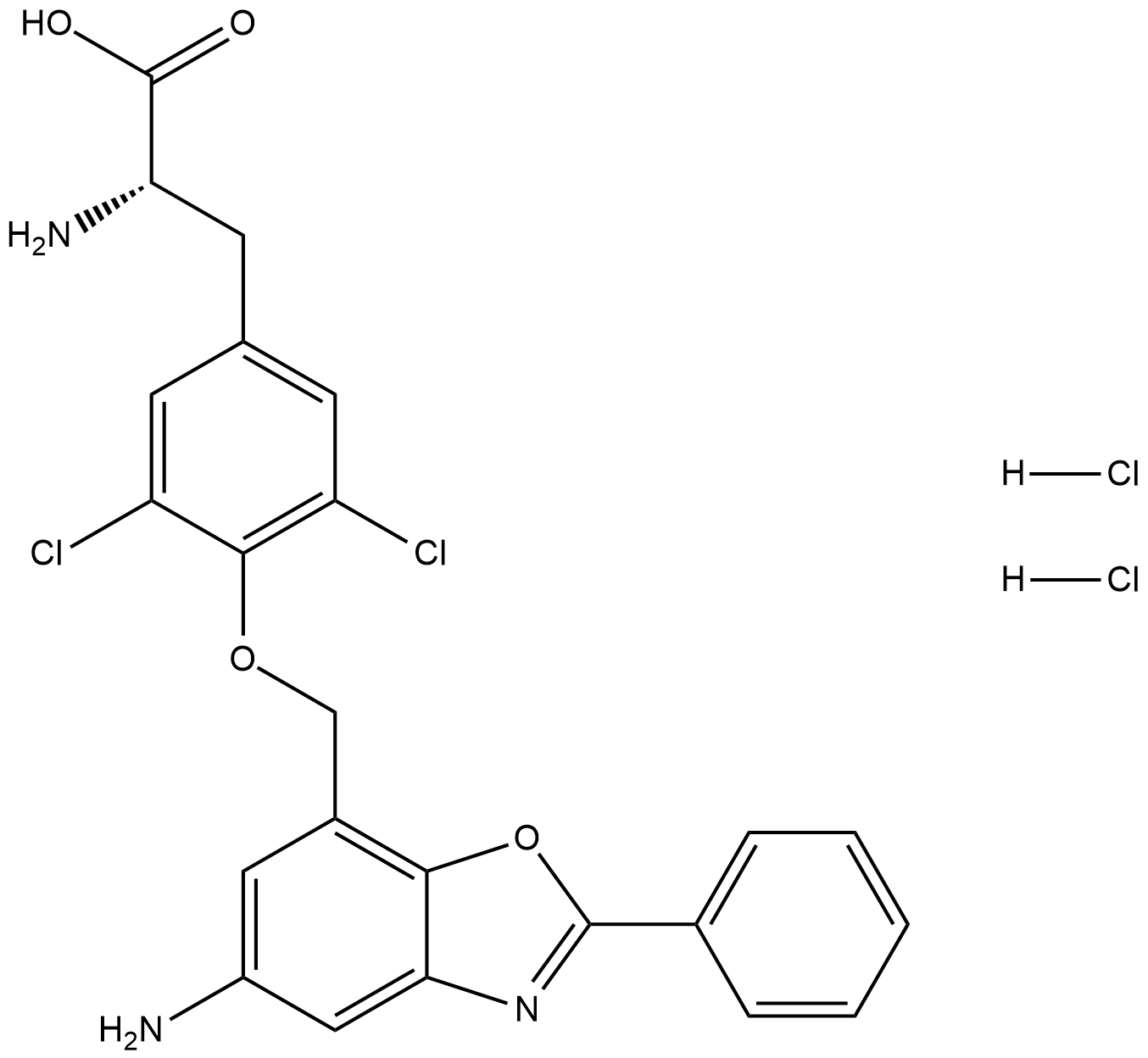JPH203 Dihydrochloride (Synonyms: KYT-0353) |
| Catalog No.GC19400 |
JPH203 Dihydrochloride is a tyrosine analog, acts as a selective inhibitor of L-type amino acid transporter 1 (LAT1), and is used in cancer research.
Products are for research use only. Not for human use. We do not sell to patients.

Cas No.: 1597402-27-1
Sample solution is provided at 25 µL, 10mM.
JPH203 Dihydrochloride is a tyrosine analog, acts as a selective inhibitor of L-type amino acid transporter 1 (LAT1), and is used in cancer research.
JPH203 Dihydrochloride is a selective inhibitor of LAT1. JPH203 (KYT-0353) inhibits 14C-leucine uptake in S2-hLAT1 and HT-29 cells, with IC50s of 0.14 uM and 0.06 uM. JPH203 (3-1000 uM) exhibits concentration-dependent inhibitory effects on S2-hLAT1 cell growth with an IC50 of 16.4 uM. JPH203 also displays inhibitory activities against HT-29 cell growth, with an IC50 value of 4.1 uM[1]. JPH203 (0.001-100 uM) inhibits the 14C-leucine (1.0 uM) uptake in a concentration dependent way by the YD-38 cells with an IC50 value of 0.79 ± 0.06 uM. JPH203 slightly shows such effects in normal human oral keratinocytes (NHOKs). JPH203 (0.01-30 mM, 1-4 d) completely inhibits the proliferation of YD-38 cells in a dose- and time-dependent manner. However, JPH203 slightly inhibits the proliferation of NHOKs. JPH203 (30 mM) induces apoptosis of YD-38 cells. JPH203 (3 mM) also increases the level of cleaved PARP in activation of the caspases cascade[2]. JPH203 (30 mM) induces mitochondria-dependent apoptosis in Saos2 human osteosarcoma cells. JPH203 (0.001-100 uM) inhibits 14C-leucine (1.0 uM) uptake slightly in FOB cells with an IC50 value of 92.12 ± 10.71 uM, but potently exihibts such effects in Saos2 cells with an IC50 value of 1.31 ± 0.27 uM. JPH203 (0.01 to 30 mM, 1-4 d) potently inhibits cell proliferation in Saos2 cells in a dose- and time-dependent manner, with an IC50 of 4.09-0.09 mM, but slightly inhibits that of FOB cells, with an IC50 of 24.1-2.8 mM[3].
JPH203 (6.3, 12.5, and 25.0 mg/kg, i.v. for 14 days) exhibits dose-dependent inhibition on HT-29 tumor growth in nude mice[1].
References:
[1]. Oda K, et al. L-type amino acid transporter 1 inhibitors inhibit tumor cell growth. Cancer Sci. 2010 Jan;101(1):173-9.
[2]. Yun DW, et al. JPH203, an L-type amino acid transporter 1-selective compound, induces apoptosis of YD-38 human oral cancer cells. J Pharmacol Sci. 2014;124(2):208-17. Epub 2014 Feb 4.
[3]. Choi DW, et al. JPH203, a selective L-type amino acid transporter 1 inhibitor,Choi DW, et al. JPH203, a selective L-type amino acid transporter 1 inhibitor, induces mitochondria-dependent apoptosis in Saos2 human osteosarcoma cells. Korean J Physiol Pharmacol. 2017 Nov;21(6):599-607.
Average Rating: 5 (Based on Reviews and 12 reference(s) in Google Scholar.)
GLPBIO products are for RESEARCH USE ONLY. Please make sure your review or question is research based.
Required fields are marked with *




















